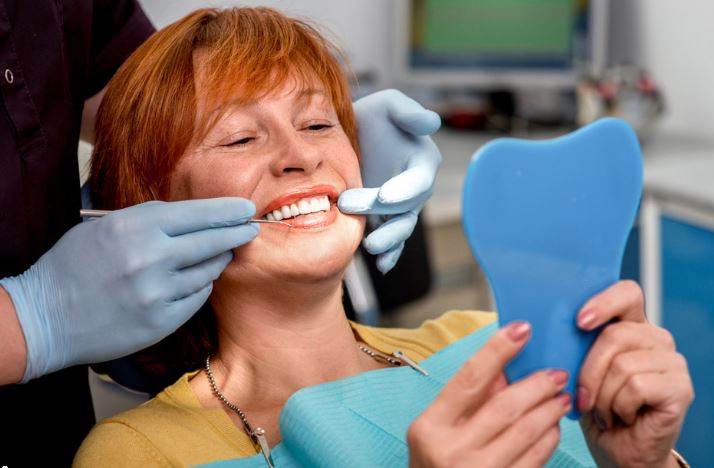Losing teeth can affect more than just your smile—it impacts your confidence, speech, ability to chew, and overall oral health. Fortunately, restorative dentistry offers effective solutions to replace missing teeth: dental implants and dentures. While both options aim to restore function and aesthetics, they serve different needs and have unique advantages. Understanding these differences can help you make the best decision for your dental health.

Dentures: An Established Option for Restoring Your Smile
For centuries, dentures have been a trusted method to replace missing teeth. Modern advances have made dentures more comfortable and natural-looking than ever before. Dentures can replace all your teeth (full dentures) or just a few (partial dentures), depending on your needs.
When Are Dentures the Right Choice?
If you’re missing most or all of your teeth, dentures are often the most practical solution. This approach is particularly beneficial for those with significant bone loss, as traditional dentures do not require the same jawbone support as dental implants.
- Advantages of Dentures:
- Quick and affordable solution.
- Non-invasive—no surgery is required.
- Can be customized to closely match the natural appearance of your smile.
Dental Implants: A Modern Solution for Missing Teeth
Dental implants are considered the gold standard for tooth replacement. These small titanium posts are surgically inserted into the jawbone, where they act as substitutes for tooth roots. Over time, the biocompatible titanium fuses with the bone, creating a stable foundation for replacement teeth, such as crowns, bridges, or implant-supported dentures.
Why Choose Dental Implants?
Dental implants are a revolutionary option for patients looking for a permanent, durable, and natural-feeling solution. They are versatile and can replace a single tooth, multiple teeth, or even an entire arch of teeth when paired with implant-supported dentures.
- Advantages of Dental Implants:
- Provide a secure and stable fit without slipping or moving.
- Mimic natural teeth in function and appearance.
- Prevent bone loss by stimulating the jawbone, preserving facial structure.
- Long-lasting—can last decades with proper care.
Understanding How Dental Implants Work
A dental implant system typically includes three main components:
The Implant Post:
A small, screw-like post made of titanium is placed into the jawbone. This serves as the artificial root for your replacement tooth.
The Abutment:
A connector piece placed on top of the implant post, the abutment links the implant to the final restoration, such as a crown, bridge, or denture.
The Restoration:
The visible part of the implant, this can be a single crown, a bridge to replace multiple teeth, or a full set of implant-supported dentures.
The process of getting dental implants typically involves multiple steps, including consultation, implant placement surgery, a healing period for osseointegration (the fusion of the implant with bone), and placement of the final restoration.
Implant-Supported Dentures: The Best of Both Worlds
For patients who need to replace an entire arch of teeth but desire the stability of implants, implant-supported dentures offer an excellent compromise. These dentures are anchored to implants, eliminating the common problems associated with traditional dentures, such as slipping and gum irritation.
With as few as four implants, a full set of teeth can be securely attached, providing a more natural and functional solution for patients.

Key Benefits of Implant-Supported Dentures:
- No need for adhesives.
- Enhanced comfort and stability.
- Improved ability to chew and speak naturally.
- Long-term cost-effectiveness compared to traditional dentures.
Choosing the Right Option for You
Deciding between dental implants and dentures depends on several factors, including your oral health, lifestyle, budget, and personal preferences.
Considerations for Dentures:
- Are you looking for a quick and affordable solution?
- Do you have significant bone loss that might make implants more challenging?
- Are you okay with periodic adjustments to maintain a proper fit?
Considerations for Dental Implants:
- Do you want a permanent, natural-feeling solution?
- Are you willing to undergo a surgical procedure?
- Do you have sufficient jawbone density, or are you open to procedures like bone grafting if necessary?
A consultation with your dentist is the best way to determine which restorative option aligns with your needs. Advanced imaging technology, like 3D CT scans, can help your dentist assess your jawbone structure and plan your treatment with precision.
Frequently Asked Questions
1. Are dental implants painful?
Dental implant surgery is typically performed under local anesthesia, so patients experience little to no pain during the procedure. Some post-operative discomfort is normal and can be managed with over-the-counter pain relievers.
2. How long do dental implants last?
With proper care, dental implants can last 20 years or more, making them a long-term investment in your oral health.
3. Can I switch from dentures to implants later?
Yes, many patients transition from dentures to dental implants as their needs and circumstances change. However, a dental evaluation is necessary to determine if your jawbone can support implants.
4. Are dental implants worth the cost?
While dental implants have a higher upfront cost, their durability, natural appearance, and ability to preserve jawbone health often make them a worthwhile investment compared to the ongoing expenses of maintaining traditional dentures.

Restore Your Smile with Confidence
Both dental implants and dentures can help you regain your smile and improve your quality of life, but the right choice depends on your unique needs and goals. Dentures remain a trusted option for those seeking a quick and cost-effective solution, while dental implants provide unparalleled stability, longevity, and natural function.
At Jay Gronemyer, DMD, we are committed to helping you make an informed decision about your restorative dental care. Our team offers advanced solutions, including traditional dentures, dental implants, and implant-supported dentures, to meet the diverse needs of our patients.
Ready to explore your options? Contact us today to schedule a consultation and take the first step toward restoring your smile. Let us help you achieve the confidence and comfort you deserve!